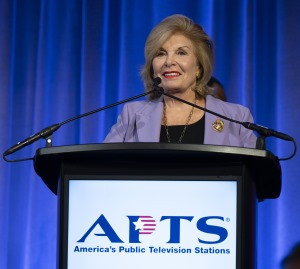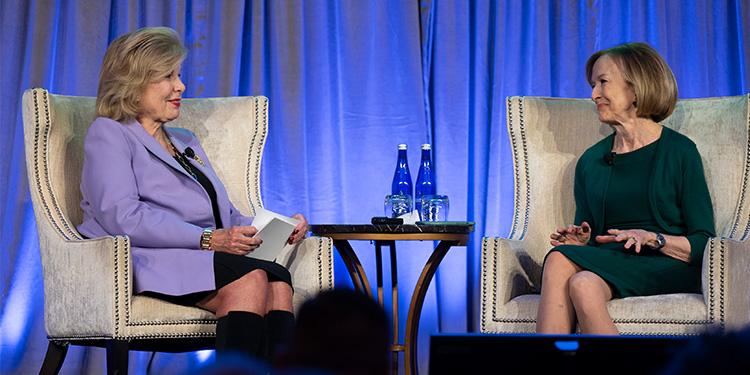What’s Your Civic Spark? CPB Explores What Inspires Americans to Become Active Citizens
February 29, 2024
What’s your Civic Spark?
For CPB President and CEO Patricia Harrison, the realization that we must become engaged in our communities came in childhood, when she moved to a Jewish neighborhood in Brooklyn and discovered that few of her new friends had grandparents, aunts, or uncles, because they had all been murdered in the Holocaust.

“That began a series of questions I started to ask, as a young girl, with no satisfactory answers. No one wanted to talk about it,” said Harrison. Years later, she read German Lutheran Pastor Martin Niemöller’s famous quote about Germans’ silence making them complicit in the Holocaust: “First they came for the socialists, and I did not speak out…” She realized that she had to talk about it. “So that was my civic spark and it led me eventually to public media, where we speak for everyone.”
Harrison, speaking at a CPB-sponsored luncheon Tuesday before more than 300 public media leaders at the APTS Public Media Summit in Washington, D.C., previewed “What’s Your Civic Spark?” This digital-first public media engagement initiative will ask Americans from all backgrounds to share their civic spark, what inspired them to be active citizens.
“Another America is waiting to be heard from,” she said. “The voices of hate and racism and polarization have had their platform for far too long. There are so many Americans working quietly every day in ways that define who we are as a people.”
The initiative is part of CPB and public media’s efforts to strengthen civil society as we prepare for the 250th anniversary of our nation in 2026.
Becky Magura, president and CEO of Nashville Public Television, said in a videotaped message that her civic spark was the realization that she could merge her two passions of education and media by working at a public media station in rural Tennessee. “And what a difference that made in the community, but really, in me.”
APTS President and CEO Patrick Butler, who is retiring later this year, said that his civic spark came when he stayed home from school in the sixth grade to watch President John F. Kennedy’s Inaugural Address. “When the president said, ‘Ask not what your country can do for you, ask what you can for your country,’ I knew that Washington was the world I wanted to live in, and that public service would be my life’s work.”
After her remarks, Harrison interviewed PBS NewsHour special correspondent Judy Woodruff on how public media can help bridge divides and empower Americans to participate in democracy.
Woodruff has spent the last year touring the country reporting on what is driving political polarization and what can be done about it for the NewsHour series “America at a Crossroads.”
“What we heard was a measure of how divided we are as Americans,” Woodruff said. Many Republicans and Democrats don’t just disagree, she said, they think that someone in the other party is a bad person. Research has shown that a lot of those attitudes are based on their media consumption, she added.
Public media, through civil discussions about divisive issues, can help change that, Woodruff said. She said she interviewed researchers at a polarization and social change lab at Stanford University who have found that getting people on different ends of the political spectrum to interact – and really listen to each other without judgment – can help them understand how they came to that point of view.
“Once they realize that the other person is a human being, they are actually able to imagine that it’s possible to have a different view and to accept that person,” Woodruff said. “It doesn’t mean they agree. But at least they listened and respected the fact that they can have a different view.”
Woodruff has hope for the future, especially among younger generations, who tell her that we need to respect other points of view. “I do have innate hope in the American people that we’re going to find a way through this,” she said.
To subscribe to CPB spotlights, press releases and grant announcements, go to cpb.org/subscribe





